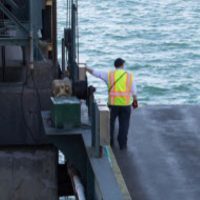Louisiana Federal Court Grants Employer’s Motion For Summary Judgment, Holds Longshore And Harbor Workers’ Compensation Act Preempts Employee’s Personal Injury Claim

On March 21, 2023, the United States District Court for the Eastern District of Louisiana ruled in favor of the employer in a personal injury case involving a shipyard employee on a motion for summary judgment. The plaintiff worker, Frank P. Ragusa, Jr., filed a lawsuit against his employer, Avondale Shipyard, for damages relating to his alleged exposure to asbestos while working at the Avondale Shipyard in the 1970s. Defendant Avondale Shipyard moved for summary judgment, arguing that Mr. Ragusa’s claims were preempted by the Longshore and Harbor Workers’ Compensation Act (LHWCA), and, accordingly, is the exclusive remedy for Mr. Ragusa’s claims. The court ultimately agreed.
The Louisiana federal court’s ruling highlights the two laws that govern workers’ compensation claims in Louisiana, and the differences between them when it comes to worker eligibility. While most workers in Louisiana are covered by the state Louisiana Workers’ Compensation Act, with some exceptions, certain maritime employees are exempted from the Louisiana Workers’ Compensation Act and, instead, are covered by the federal Longshore and Harbor Workers’ Compensation Act. The court’s ruling provides guidance as to when a shipyard employee may be deemed to fall under the LHWCA and not under state workers’ compensation laws.
Workers Covered Under the Longshore and Harbor Workers’ Compensation Act
The purpose of the LHWCA is to provide certain covered maritime employees with “medical, disability, and survivor benefits for work-related injuries and death.” For a worker to be covered under the LHWCA, that worker must be in a “traditional maritime occupation” as defined by the LHWCA, and the workplace injury must have occurred on the “navigable waters of the United States” as well as “any adjoining pier, wharf, dry dock, terminal, building way, marine railway, or other adjoining area customarily used by an employer in loading, unloading, repairing, dismantling, or building a vessel.” In Mr. Ragusa’s case, the court found that he met the definition of a covered maritime worker because he was a tacker who built barges and a crane operator on a ship’s deck. The location of Mr. Ragusa’s workplace injuries was the Mississippi River. Therefore, the court held that the remedy for Mr. Ragusa’s workplace injuries is the LHWCA, and his personal injury claims were, accordingly, preempted by federal law.
Help with Your Louisiana Workers’ Compensation Claim
There is no doubt that workers’ compensation laws in Louisiana are complex, and it is not always easy to determine whether you may qualify. If you have been injured on the job in Louisiana, do not hesitate to reach out to a skilled and experienced Louisiana workers’ compensation lawyer. The experienced Louisiana workers’ compensation lawyers at Lunsford Baskin & Priebe offer a free and confidential consultation to learn about your workplace injury case and to see if they can help you get workers’ compensation benefits due to you. Contact the experienced Louisiana workers’ compensation lawyers at Lunsford Baskin & Priebe today and find out about your rights to workers’ compensation for free.
Source:
jdsupra.com/legalnews/defendant-s-motion-for-summary-judgment-6067183/

